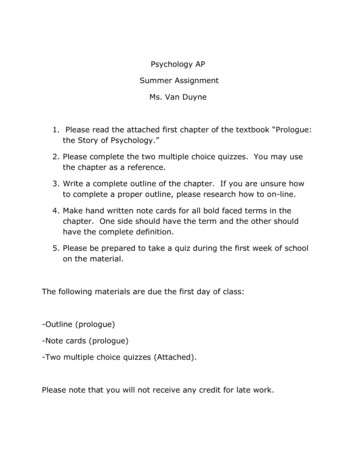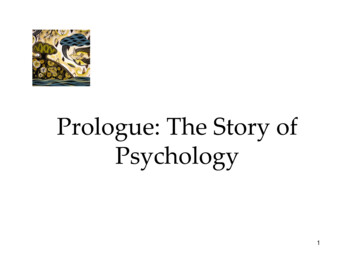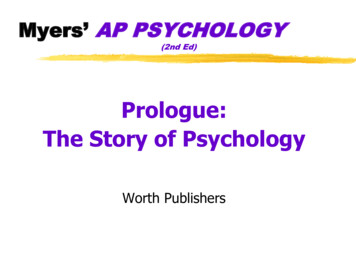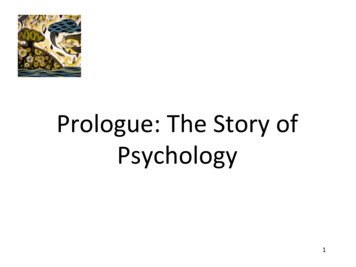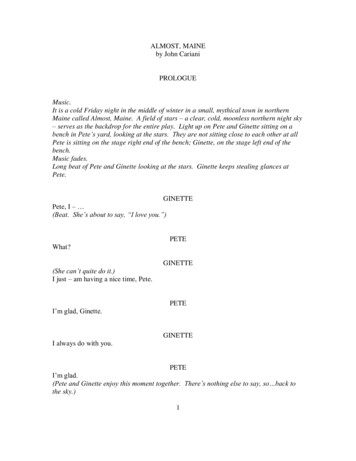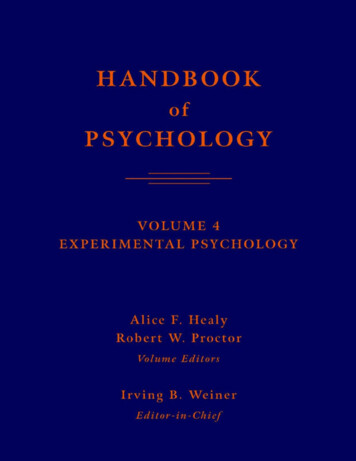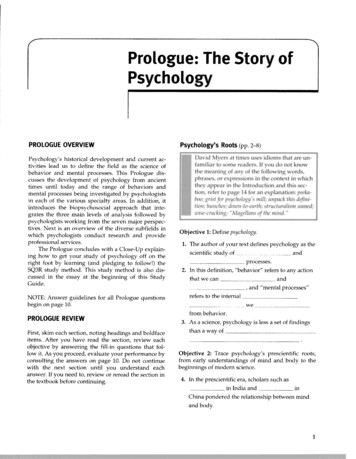
Transcription
rPrologue: The Story ofPsychologyPROLOGUE OVERVIEWPsychology’s historical development and current activities lead us to define the field as the science ofbehavior and mental processes. This Prologue discusses the development of psychology from ancienttimes until today and the range of behaviors andmental processes being investigated by psychologistsin each of the various specialty areas. In addition, itintroduces the biopsychosociai approach that integrates the three main levels of analysis followed bypsychologists working from the seven major perspectives. Next is an overview of the diverse subfields inwhich psychologists conduct research and provideprofessional services.The Prologue concludes with a Close-Up explaining how to get your study of psychology off on theright foot by learning (and pledging to follow) theSQ3R study method. This study method is also discussed in the essay at the beginning of this StudyGuide.NOTE: Answer guidelines for all Prologue questionsbegin on page 10.PROLOGUE REVIEWFirst, skim each section, noting headings and boldfaceitems. After you have read the section, review eachobjective by answering the fill-in questions that follow it. As you proceed, evaluate \ our performance byconsulting the answers on page 10. Do not continuewith the next section until you understand eachanswer. Tf you need to. review or reread the section inthe textbook before continuingPsychoLogy’s Roots (pp. 2—8)David Myers at times uses idioms that are unfamiliar to some readers. If you do not knowthe meaning of any of the following words,phrases, or expressions in the context in whichthey appear in the introduction and this section, refer to page 14 for an e\planation: peekaboo; grist for psychology’s mill; unpack this definition; haii ches; down—to—earth; st ru cturalism waned;wise-cracking; “Magellans of the in md.”Objective 1: Define psychology.1. The author of your text defines psychology as thescientific study of-andprocesses.2. In this definition, “behavior” refers to any actionthat we canand,and “mental processes”refers to the internalwefrom behavior.3. As a science, psychology is less a set of findingsObjective 2: Trace psychology’s prescientific roots,from earl understandings of mind and body to thebeginnings of modern science.4. In the prescientlfic era, scholars such asin India andinChina pondered the relationship between mindand body1
2Prologue The Story of PsychologyandS Ihe Greek philosophersviewed mind and body as(inseparable / separable), andassumed that knowledge isinnate learned). The Greek philosopher whoargued that all knowledge comes from experiences stored in memories isf nlike his teacher, who derived principles fromhe derived principles fromareful6. In the mOOs, the views of the Greek philosopherswhowere re ived bybelieved that some ideas are innate; by, nho becameLnglishman,one of the founders of modern science; and bywho believed that knowledge originates in experience. This idea, alongwith the principle that science flourishes throughobservation and experiment, is calledObjective 3: Explain how the early psychologists‘ought to understand the mind’s structure and functions and identify some of the leading psychologistsn ho worked in these areas.7The first psychological laboratory n as founded inHis stu1879 by Wilhelm, introduced the schooldent,hich explored the basicelements of mind using the method ofThis method proved(reliable/unreliable), and psvcholofogist,isintroduced the school ofwhich focused on hon menI ir d behax ioral processes enable the organismadapt sun iw and flourish.8. Ihe first female president ot the AmericanPsychological Association wasrneisthe first is omane a PhD. in psy chology watoanObjective 4: Describe thefrom the l920s thrmh todars9. fire historical rfields I10. Some r’arirwhothepsidlLuhc”nlogit mepioneeredpersnf phr11’tfle t5J\ enalitioust‘and Jean Piag Iii, In its earl est xthe cieiwe ofan i n’sthe t2U into the irmtt,I’ re scwas redefinedyour text define psrh,x asprocesses.12. As a response I I ud’too mechanst,andnv’pinnerroe d;-iCP;an’spectis e emphasmn d inpotential f13. During the 106(spsvcin i ,ione enret oIen’m a‘‘ntmfl inrecapture interet inprocesses. Uhe ft d o’andfunction raIledprocessesicContemporary PsyoLo8‘RIthlfvoud nitfellers ‘., mined p1 n ;s ç rcontext iP tmbn;’ tbe’ epp aens’s a:to nage- 4- 1 esi/ed 5” 5I; ‘1111/: a’11 er , / aa’ evesI iRed nine [aIa’then’ is, /57 iatl/, /‘‘rP a‘t-a
Contemporary Psychology1. Worldu ide, the number ot psychologists is(increasing decreasing).Objective 5: Summariie the nature nurture debate inpsychology, and describe the principle of naturalselection2. Ihe naturenurture issue is the controversy overthe rc latix e c ontributionq 013. Ihe Creek philosopher who assumed that character and intelligence are inherited isI he Creek philosophern ho argued that all knowledge comes from scm38. Psychologists who study how natural selectioninfluences behar ior tendencies are is orkmg fromtheperspective, is hereasthose concerned with the relatir e influences 01genes and environment on indir idual differencesare working from the9, Psy chologists who believe that behas ior springsfrom unconscious drives and conflicts are is orking from theperspective.10. Psychologists who study the mechanisms bywhich observable responses are acquired andsorv experience is4. In the I 600s, the r jews of the Creek philosopherswere rer ir ed bywhochanged are working from theperspective.,belier ed that most knowledge comes in throughthe senses, and,whobelieved that some ideas are innate.5, In 1859, naturalistexplained species r ariation by proposing theprocess ofwhich worksthrough the principle of,Objective 6: Identify the three main levels of analysisin the biopsychosocial approach, and explain whypsychology’s r aried perspectives are complementary.6. F ach person is a complexthat is part of a largerand at the same time composed 01 smaller systems. For this reason, psychologrsts work from three mainandis hh together forr r an mtetiratedapproach to the study ofbchas ior and mental processes.7 Psychologists who study how the body and brainenable emotions memories, and sensory expericur e’ arc is orkmti from thepitic11, lIreperspective exploreshow our minds encode, process, store, andretrieve information,12. Psychologists who study hon thinking andbehar ior vary in different situations are workingfrom theperspective.-13. The different perspectives on the big issues(contradict/complement)one another,Objective 7: Identify some of psychologs ‘s subfields,and explain the difference between clinical psychology and psychiatry.14. Psychologists may be invols ed in conductingwhich builds psychology’s knowledge base, orwhich seeks solutions to practical problcms15. Psr chologists who help people cope s ‘th problems in living are calledpsychologists. Psychologists who study, assess,and treat troubled people are calledpsychologists16. Medical doctors who provide psychotherapy andtreat phr sical causes of psychologkal disordersare called
ologue The Story of PsychologyoseUp: Your Study of Psychologyif r on do not know the meaning of the foiIowthe context in which itappears in the tt xt refer to page 1 for an\rlanatlon: p ian! oracttceing e\presslon inOhjecti e 8: utatuHi4. A ho introduced the early school of structuralisni?a. Edward Titchenerb. Wilhelm XVundtc. William Jamesd. Mary Whiton Calkinse ettecin e study technique%.rcier to na-u’r any subject. \ ouprocess it.muststud\ method incorgoIatusfive steps. a.h.,5. Who wrote the early textbook Prmciples ofc.PsucIioloiI?d.Iista. Wilhelm Wundtb. Ivan Pavlovhi e additional study tips identified in the text.Multip1cC1zoice Questionsour answers to the following questions andcheck them n ith the answers beginning on page 1 0. Ifyour mswer is in orrect, read the explanation forn in it is incorrect and then consult the appropriateot the text hn parentheses following the correct1. Tnear]iest days. ps choiogriias definedc. Jean Piagetd. William James6. Psychologists who stud\ the degree to is hichgenes influence our personality are working tromperspective.thec. behavior geneticsa. behas iorald. neuroscienceb. evolutionaryPROGRESS TEST iCircle3. I oday, psychologx is defined as the:a. scientific study of mental phenomena.b. scientific study of conscious and unconsciousactiv itr.c. scientific studr of behavior.d. sdentific study of behavior and mentalprocesses.jsa. inu nirnental life.h. tuci\ o conscious and unconscious activity.c. cicnt fir tudi ot obsen able beha ior.d. cicntitic study of hehasior and mentalars2. A hen oulo be most likeir to agree with the statennnt ‘Px cnoiogx should investigate onlyboha’ ior that can he oherved”?a. \kihielm A undtind I mud1h. “rgm1 ‘ho 13 Aatc md. A ibiam I it7. Which of the following exemplifies the issue ofthe relatix e importance of nature and nurture onour behavior?a. the issue of the relative intluence of biologyand experience on behaviorb. the issue of the relative influence of rewardsand punishments on behaviorc. the debate as to the relative importance ofheredity and instinct in determining behaviord. the debate as to whether mental processes area legitimate area of scientific studr8. The sex enteenth-centurv philosopher who believed that the mind is blank at birth and thatmost knowledge comes through sensory expenence is:c. Descartes.a, Plato,d. Locke,b. Aristotle.9. A hich seven teenth—centurx philosopher belies edthat some ideas are innate?a. Aristotleb. Platoc. Descartesd. Locke
Progress Test I10, Which psychological perspective emphasizes thernteraction of the brain and body in behavior?a. neuroscienceb. cognitivec. behaviorald. behavior genetics11. A psychologist who explores how Asian andXorth American definitions of attractiveness differ is working from theperspective.a. behavioralC. cognitiveb. evolutionaryd. social-cultural12. A psychologist who conducts experiments solelyintended to build psychology’s knowledge base isengaged in:a. basic research.b. applied research.c. industrial-organizational research,d. clinical research.13, Psychologists who study, assess, and treat troubled people are called:a, basic researchers.b. applied psychologists.c. clinical psychologists.d, psychiatrists.514. Today, psychology is a discipline that:a. connects with a diversity of other fields,b. is largely independent of other disciplines.c. is focused primarily on basic research.d. is focused primarily on applied research.15. (Close-Up) In order, the sequence of steps in theSQ3R method is:a. surve, review, questIon, read, reflect.b. review, question, survey, read, reflect.c. question, review, survey, read, reflect.d. survey, question, read, review, reflect.16. Francis Bacon’s ideas led most directl to thescholarly view known as:a. functionalism.b. structuralism.c. empiricism.d. introspection.
6Prologue The Story of PsychologyMatching ItemsMatch each psychological perspective, school, andsubfield with its definition or description.Definitions or DescriptionsTerms1. neurocience perspective2. s. )cial-cultural perspective3. pvchiatrv4. clinical psychology5. behavior genetics perspective6. behavioral perspective7. industrial organizational psychology8. cogniti e per’cpective9. basic research10. applied research11. evolutionary perspective12. psychodynamic perspective13. structuralism14. functionalism15. empiricisma. behavior in the workplaceb. how people differ as products of different environmentsc. the study of practical problemsd. an early school of psychology that used introspection to explore the contents of the minde. the mechanisms by which observable responsesare acquired and changedf. how the body and brain create emotions,memories, and sensationsg. how the mind encodes, processes, stores, andretrieves informationh. the view that science flourishes through observation and experimentationi. how natural selection favors traits that promotethe perpetuation of one’s genesj. the study, assessment, and treatment of troubledpeoplek. the medical treatment of psychological disorders1. the disguised effects of unfulfilled wishes andchildhood traumasm. adds to psychology’s knowledge basen. an early school of psychology that focused on theadaptive value of thoughts and behaviorso. how much genes and environment contribute toindividual differencesPROGRESS TEST2Progress Test 2 should be completed during a finalchapter review Answer the following questions afteryou thoroughly understand the correct answers forthe section reviews and Progress Test 1.2. Who would be most likely to agree with the statement, “Psychology is the science of mental life”?a. Wilhelm Wundtb. John Watsonc. Ivan Pavlovd. virtually any American psychologist duringthe 1960sMultiple— Choice Questions1. The first psychology laboratory was establishedin the yearbyc. Preud; 1900a. Wundt; i879d. Watson; 1913b. James; 18903. Ina.b.c.d.psychology, “behavior” is best defined as:anything a person says, does, or feels.any action we can observe and record.any action, whether observable or not.anything we can infer from a person’s actions.
Fa4Maslorire r rostab12)rdaII fitiCtiotcsd a ibedkaC’FuatygIbirritI UC-SiraustCd std itisr) V)iIIft dstethat p vaetab5)1-indavi questions.; pphed prc blems,b has ior and mtntatrria13 WtSaIt‘frifCb siciadrtptstudf mentatdidhh6. tisohi t r ipphrcsa ph osopts aid t en rstrb. pht sio ts red hen strishfo )FFSd brol gvd phroopFvarl oFt5‘arc the disciaa4.rr 41,,aincddes8. Ihc r vtherr rl rcd s prcccsscs stoes andeti ucs i for i tior s Ft pr nary corcern orthcpsfn rest e ciLl 1 culturalaCduni ‘abcutonrs9Ph FpIn caC,rscoois psiraainbI)drat)Crdn lualsoIpphcds also aistdripi15. ((loscb ) F r ajSQ3t tudy netFtrrfl)a peoplenbc ti yac ci ri nb many stud i 5 0ILata dt. I,,Iis sadn tinh oaSFan ‘ram ctCd osrcirr rdpt16. lIt bi )psd.os Xipuimportance otiia. ditfe ‘er t c citiranin ni5IIb, basic scCcrC. pure r sc irii sira r eaarso F5ap10.STrue—False RemsisaiiirnsnipsrtclcF t r toFaabbaicphcr afro bchcscd that in
2 Prologue The Story of Psychology S Ihe Greek philosophers and viewed mind and body as (inseparable/ separable), and assumed that knowledge is innate learned). The Greek philosopher who argued that all knowledge comes from experi ences stored in memories is f nlike his teacher, who derived principles from he derived principles from areful 6. In the mOOs, the views of the Greek philosophersFile Size: 2MBPage Count: 16
